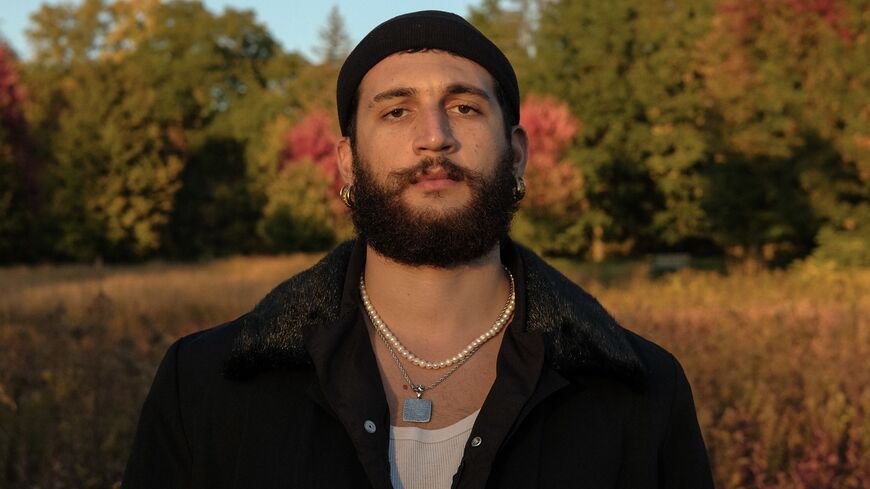Independent researcher, curator and artist Adam HajYahia believes that our imagination about Palestine has fallen short and become too narrow, colonized and segregated.
His exploration of structural and hierarchical violence and its intersections with capitalist, colonial, sexual and social dynamics took material shape recently in an exhibition called “Carnal Politics: Sex, Desire and Anti-Colonial Deviance in Mandate Palestine.”
The show at the Open Society University Network's Center for Human Rights & the Arts at Bard College is the first iteration of an ongoing project based on Israel’s Byzantine State Archive. HajYahia discovered a swath of police records, personal correspondence and press materials that revealed insight into the stories of Palestinians, sex workers and feminists that time has forgotten.
The show caused a stir, offering the public a view of rarely seen materials and HajYahia’s own analysis through original work that manipulates and re-creates the documents through a modern lens. The show re-imagined new possibilities for Palestine’s future by linking today’s struggle to a long history of liberation and resistance.
Queerness vs. deviance
When Al-Monitor began speaking with the artist about uncovering a “queer” Palestine, he disagreed, referring to the subjects of his research as part of “sexual deviance.”
But doesn’t “deviance” have a negative connotation? Not for the artist, who finds it connected to what he calls “psychic desire,” which manifests through various sexual acts such as sex work, same-sex relations and cross-dressing.
In “Carnal Politics,” HajYahia looked at stories of women who ran away from their husbands to live together and establish anonymous lives in the city, or of 16-year-old boys who dressed in feminine clothing and performed commercial sex with men as a way to bypass laws that criminalize sodomy yet permitted prostitution. He looked at stories of women who left motherhood and their spousal commitments to join anti-colonial militant resistance, and others who formed communal economic structures to cut ties with their abusive families. Still other stories told of revolutionary men who participated in the Great Arab Revolt were yet imprisoned for engaging in same-sex relations in public spaces.
“I intentionally do not refer to the people who are part of such a history as a ‘queer’ and rather look at a broader framework of ‘deviance’ as a mode of resistance against power and regulation of bodies, psychic desire and non-normative forms of living,” explains HajYahia.
The archival research
In 2018, the artist started looking in the Israel State Archives in Jerusalem for documents about Akka’s (Acre) urban landscape.
That’s when he found records of a British Mandate court hearing of two Palestinian sex workers who testified against a British soldier that had murdered their colleague and friend. “Both women were trying to make a case that the murder of their fellow sex worker and friend is not coincidental and is to be understood within a larger framework of British colonial policies and Zionist aggression toward Palestinian women that perform commercial sex,” explains the artist.
To HajYahia, the words of the sex workers demonstrated how they were fully aware of their conditions at the time. Although they did not use this particular language, they framed the murder both as a colonial crime and one of an exploitative capitalist nature.
The case took place in 1936 in Palestine, at the height of the Great Arab Revolt (1936-39), and it revealed an anti-colonial struggle much more multi-layered than the one we usually perceive. HajYahia expanded his research to look into the National Archives and the Women’s Library Archive at the London School of Economics. He learned to recognize "the kind of imagination of a different Palestinian future that was taking form before the Nakba during the 1920s-40s.”
Because of this utopian vision of the future found in the documents, HajYahia still resists framing the project as historical, even though it takes a very particular historical time — the British Mandate period. He prefers to look at it as a rather futuristic or even fictional project.
The exhibition
Not only does “Carnal Politics” offer rarely seen materials, but also presents HajYahia’s own original work that manipulates and recreates the documents.
The artistic part of the project took the form of an installation of both real and re-imagined archival photographs, newspapers, and audio testimonies. “What I was aiming for is to blur the lines between the fictive and the historical, and therefore the possible and impossible, the imagined and the unimaginable,” says the artist.
HajYahia also planted hints of contemporary modernity in some images, such as staged photos of individuals in historically accurate attire, but with small details that could give away the photograph, whether it is tattoos/piercings, or a small modern object in the background.
Some actual archival documents remained the same, while others were re-dated to make them documents from the future. The intention of this was twofold. The first was the collapsing of the linear historical timeline to indicate how the past and the future are both lived in the present. The second was disrupting this notion of pre-modernity and post-modernity, especially in the colonial context of Palestine.
“Oftentimes, in some discussions about Palestinian history, we romanticize a pre-colonial mythical past as the time we ought to return to,” explains HajYahia. “It is always tainted with nostalgia for an abstract unknown time-space where violence supposedly wasn’t governing material and psychic Palestinian life, but how do we locate that time-space?”
His solution is to look into the past, into history, for the an imagination of a future. “These traces and imaginations outlive the conditions of their making, and those who fabulate them reach us in the present, and we can channel them into an emancipatory future, with new emancipated Palestinian subjects.”
Besides his work in art, these days HajYahia is devoting himself to writing, pedagogy, and art curation. He is curating a film program that will go live at the end of the year, and publishing a couple of texts about images. His research continues in psychoanalysis, capitalism, and resistance in Palestine, Syria and Iran.








